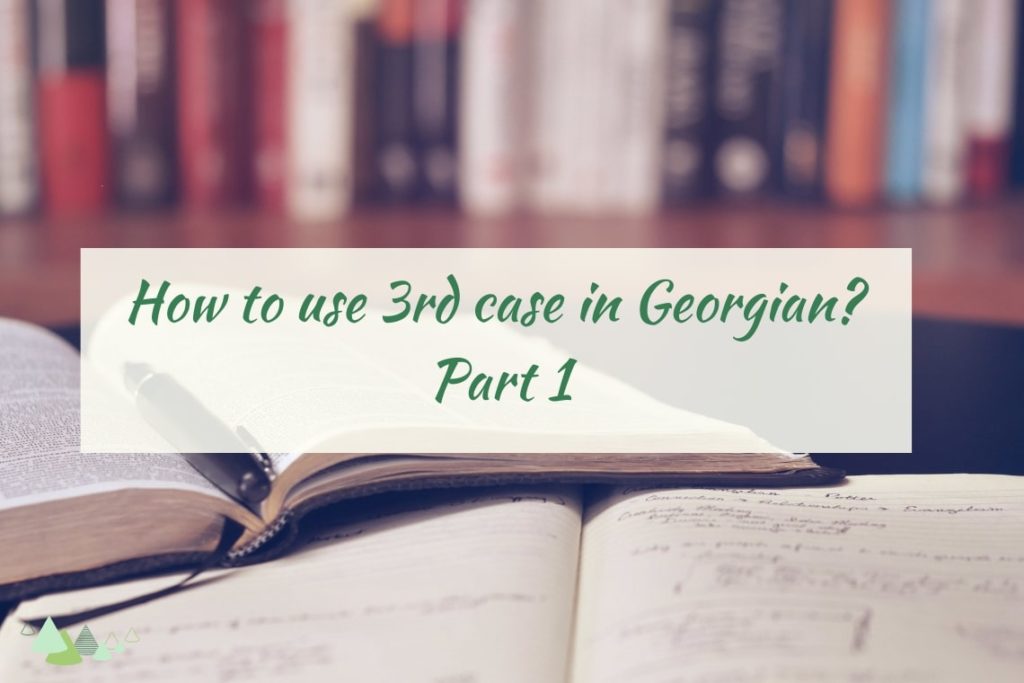The second case – Ergative – in Georgian often seems the most complex one, which is just a myth. It’s connected with the fact that it does not exist in many other languages. However, the declination itself and its usage is both logical and easy. With this article you will learn the basics of it.
Ergative – because this is the non-Georgian name of the case – seems more useful on more advances levels than at beginner. Especially that you may see it in more complex grammatical constructions. However, the declination of words itself is quite easy. I may even risk stating that it is much easier than the 3rd case (Dative).
Georgian name of this case is მოთხრობითი. This is up to you to decide whether to learn Georgian names or not. It’s worth doing in case your teacher is Georgian, so the communication during lesson may be much faster. The second situation is when you reach intermediate level of Georgian language.
How to decline the nouns in Ergative in Georgian?
Let’s start with the most important one, so nouns declination. There are 2 types of endings in Ergative: –მ and –მა. First one is used when a word ends with vowel, e.g. გოგო – გოგომ (a girl) or დედა – დედამ (a mother). Then, the second one is used when a word ends with consonant or ი, which is this word’s ending (then it drops out of the word): ბიჭი – ბიჭმა (a boy) or შვილი – შვილმა (a child).
As only 2nd case, Ergative, has such endings, the study of Georgian language and Georgian cases becomes much nicer. As a result you can recognize this case quicker when hearing or seeing it.
How to decline adjectives in Ergative?
Sole nouns may not suffice when we speak, so let’s learn also how adjectives behave in second case in Georgian? Maybe you already know that there are two types of adjectives declination: if the adjective stays together with a noun in a sentence or it somehow replaces the noun. Focusing on the second option, imagine such a dialogue:
– Which girl ate a dinner?
– The blue-eyed (one – this word will not be needed in Georgian).
As you may see, there is no word “girl” in the answer, hence the adjective will get exactly the same ending as the noun would get. So you just use the rules we discussed above.
If instead the answer is „ The blue-eyed girl ate a dinner” (the adjective stays together with the noun), we have to look at the last letter of the adjective to decline it correctly. However, if it is ი, it drops off and one adds the-მა ending. And if it is other vowel, the adjective stays as it was without any changes. Isn’t study of Georgian language easy and logical?
When to use 2nd case, Ergative?
The time has come for the vital question: Why should we really learn it? The best moment to get acquainted with it is when you start learning aorist, (Georgian tense similar to past simple). The verbs like „to work”, „to live” or „to do” require that the subject stays in Ergative. For example the sentence “The mother did it.” will be in Georgian: დედამ ეს გააკეთა.
Ergative, so მოთხრობითი, also can be found in optative forms or when we want to say: „someone has to do or must do something”. Those three examples may already show you that this is not the first Georgian case you should focus on. It’s much better (and useful) to start with the 3rd case, Dative. Although, if you already enter A2 level or higher, it’s hard not to know it. Additionally, there are a few verbs which already in present tense expect us to use Ergative as a case fo the subject. But those are really a few of them.
Thsi is the first article in the series about 2nd case, Ergative. The next ones are soon to be published. Additionally, we regularly organize live mini-lessons during which you can learn how to use different verbs and grammatical forms. Therefore, if ou do not want to miss any of those, join our newsletter “Caucasian mail”.
Check your knowledge
If you want to check your new knowledge, do the below quiz. The quizzes are published first on our InstaStory and Facebook profiles and then they are published under the posts. The answers you’ll find below.
Which ones are correctly put in Ergative:
- დედამ
- მამიდამა
- კარგმა ამინდმა
- ბიჭიმ
- ლამაზი შვილამ
- პატარა გოგომ
How many do you know?
Answers:
- correct 2. not correct 3. correct 4. not correct 5. not correct 6. correct



